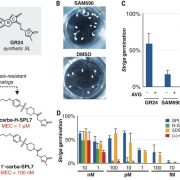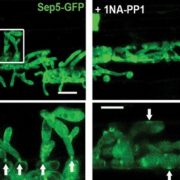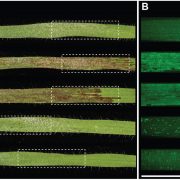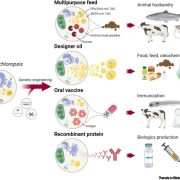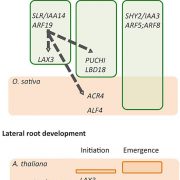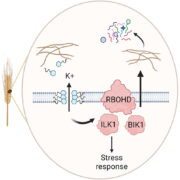Transgenic Cavendish bananas with resistance to Fusarium wilt
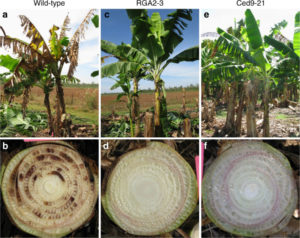 Banana, the common breakfast component, is also a staple food in some regions of the world. More than 99% of the bananas exported world-wide are the clonally-propagated Cavendish variety, which have very little genetic variation and so are prone to disease outbreaks. Recent years have witnessed the emergence of a fungus that has threatened Cavendish banana production, Fusarium oxysporum f. sp. cubense tropical race 4, which causes Fusarium wilt or Panama disease. There is no effective chemical control against this pathogen and acceptable resistant varieties are yet lacking. Dale et al. have genetically modified the Cavendish banana and have found a striking degree of resistance against this fungal disease. The authors report on their 3-year field trial of two transgenic lines of Cavendish banana, one that is transformed with RGA2, a gene that is found in south Asian diploid banana subspecies. RGA2 homologs are naturally present in Cavendish but are expressed at a low level. The other gene, Ced9, is derived from a nematode and encodes for anti-apoptosis property which makes Cavendish banana complete disease-free. These results demonstrate exciting opportunities from GM technology as a solution for controlling Panama disease of banana. (Summary by Amey Redkar) Nat. Commun. 10.1038/s41467-017-01670-6
Banana, the common breakfast component, is also a staple food in some regions of the world. More than 99% of the bananas exported world-wide are the clonally-propagated Cavendish variety, which have very little genetic variation and so are prone to disease outbreaks. Recent years have witnessed the emergence of a fungus that has threatened Cavendish banana production, Fusarium oxysporum f. sp. cubense tropical race 4, which causes Fusarium wilt or Panama disease. There is no effective chemical control against this pathogen and acceptable resistant varieties are yet lacking. Dale et al. have genetically modified the Cavendish banana and have found a striking degree of resistance against this fungal disease. The authors report on their 3-year field trial of two transgenic lines of Cavendish banana, one that is transformed with RGA2, a gene that is found in south Asian diploid banana subspecies. RGA2 homologs are naturally present in Cavendish but are expressed at a low level. The other gene, Ced9, is derived from a nematode and encodes for anti-apoptosis property which makes Cavendish banana complete disease-free. These results demonstrate exciting opportunities from GM technology as a solution for controlling Panama disease of banana. (Summary by Amey Redkar) Nat. Commun. 10.1038/s41467-017-01670-6


